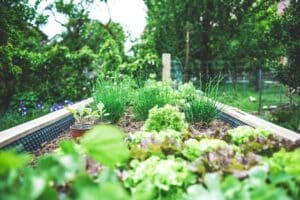Gardens can be great for the environment and for wildlife – and they’re good for people too, according to an increasing body of research.

Gardening has a long and connected history to science and medicine. For centuries gardens have been a source not only of food on the table but also remedies to treat common ailments.
Some of these, such as St John’s wort for depression and willow for headaches, have been embraced by modern science. But what about the benefits of gardens and gardening themselves? Are they well-evidenced, and if so, how can we make the most of them?
Make gardening part of your everyday life
It is increasingly acknowledged that gardens and green spaces are associated with better physical, social and mental health. British physician Sir Muir Gray famously said that everyone needs a ‘Natural Health Service’ as well as a National Health Service.
The NHS has, since January 2019, officially included social prescribing in its Long Term Plan. As the population ages and healthcare costs spiral, social prescribing and preventative healthcare have a renewed importance.
We need to consciously embed gardens and gardening into daily life for everyone. In 2021, the RHS released research that revealed those who garden every day have wellbeing scores 6.6% higher and stress levels 4.2% lower than people who don’t garden at all.
Surveying more than 6000 people the research showed a significant association between gardening more frequently and improvements in wellbeing, perceived stress and physical activity.
Feel the multiple benefits of exercise
It’s common knowledge that exercise is good for you. The NHS considers it essential to living a healthy and fulfilling life and it’s medically proven that people who do regular physical activity have up to a 35% lower risk of coronary heart disease and stroke. Physical and mental illnesses associated with our increasingly sedentary urban lifestyles have a growing economic and social cost.
But lesser known is the role that gardening can play in helping to keep you fit and healthy. Gardeners might be delighted to learn that the number of calories burnt from 30 minutes of gardening is comparable to playing badminton, volleyball or practising yoga.
However, as with any physical activity, like running or weight lifting, there is the potential for injury if done incorrectly. The RHS has embarked on research with Coventry University to better understand how common garden practices like digging can be done with minimal muscle strain.
Using technology more commonly found on Hollywood film sets we’ve been examining, for the first time, the loads exerted on the body’s joints, bones and muscles to help people enjoy gardening and digging for longer.
Preventing mental ill-health
The benefits of being in the garden run much deeper than just exercise. A King’s Fund report on the health benefits of gardening were found to be broad and diverse, with research studies showing significant reductions in depression and anxiety and improved social functioning.
Gardening can also help maintain independence and prevent cognitive decline. Tokyo and Exeter Universities also found robust evidence for the positive effects of gardening on health, calling for governments and health organisations to promote gardening.
An increasing number of GPs are prescribing gardening not only for rehabilitation but also as a preventative mechanism. In Lambeth, London, 13 GPs have opened community gardens with positive effects.
In 2014, researchers from the University of Exeter Medical School analysed mental health data from 1,000 urban residents and used high-resolution mapping to track where the subjects had lived over 18 years.
They found that people living near to green space reported less mental distress, even after adjusting for income, education, and employment. In 2009, a team of Dutch researchers found a lower incidence of 15 illnesses -including depression, anxiety, heart disease, diabetes, asthma, and migraines – in people who lived within half a mile of green space.
The RHS’ own research and practical programmes support these findings. Adding plants to bare front gardens reduced stress as much as 8 mindfulness sessions. Greener front gardens are associated with healthier physiological stress regulation (daily cortisol patterns). Four in five teachers who signed up to the RHS Campaign for School Gardening reported that gardening has had a significant positive impact on pupil health and wellbeing.
In 2017, the RHS teamed up with the NHS to promote the role that gardens can play for good mental health and wellbeing. In 2018 and 2019, the RHS donated gardens from the RHS Chelsea Flower Show to Highgate Mental Health Centre and to Dewnans Centre in Devon. Existing studies have found that patients with rooms overlooking nature recover faster than those who face buildings.
There is an opportunity for gardening to play a central role in improving our nation’s mental health and wellbeing; currently the RHS is undertaking research in collaboration with the University of Surrey and the University of Sheffield to better understand how to maximise the health benefits of gardening. For example, the RHS are exploring the role of colour and scent on stress and
wellbeing in the garden context.
Eat your greens! Healthy eating and plant-based foods
Research by the American Heart Association has shown that diets higher in plant foods and lower in animal foods may be linked to a lower risk of dying of a heart attack, stroke, or other disease, notably a 32% lower risk of cardiovascular disease.
In terms of weight management and the UK’s obesity problems, the NHS cites fruit and veg as being important for maintaining a healthy weight. Yet in 2018 only 28% of adults were eating the recommended five portions of fruit and vegetables. Growing your own really is worthwhile: you’ll have plenty of fruit and veg on tap. Finding ways to use them up does dietary wonders, and you can pick as much as you need, when you need it. It’s also worth noting that an important by-product of the ‘grow your own’ phenomenon is a reduction in plastic packaging and food waste.
The RHS has seen an increase in the number of community gardening groups (Britain in Bloom, It’s Your Neighbourhood) helping to address healthy eating in their areas. Actions include growing fruit and vegetables in community orchards and allotments, providing and stocking community fridges and supplementing charity food parcels with fresh produce.
These life-affirming actions are changing the lives of thousands of people up and down the country – daily evidence that gardens and gardening benefit the mind, body and spirit. There’s never been a better time to pick up that trowel and get growing.
(Article source: RHS)

